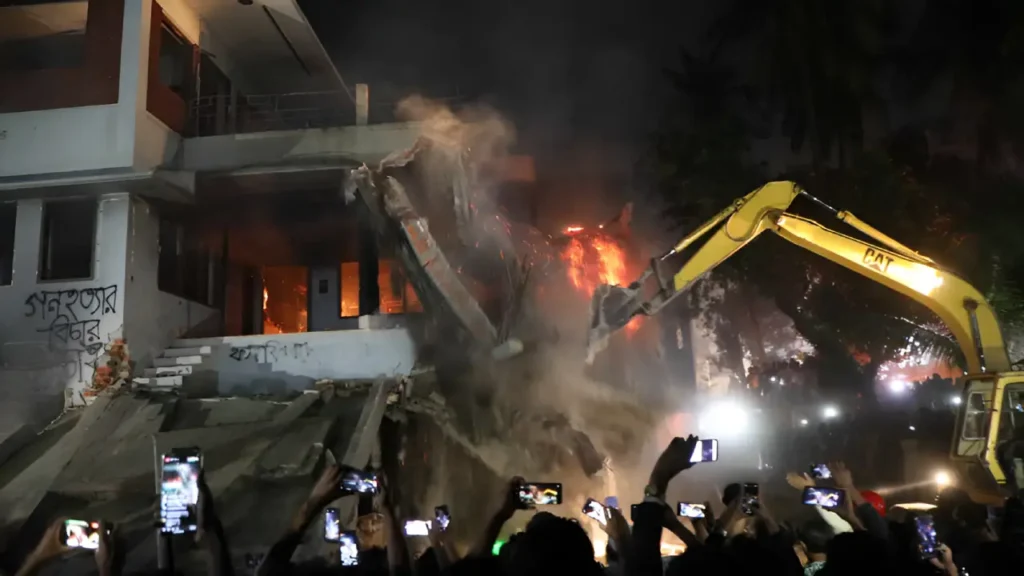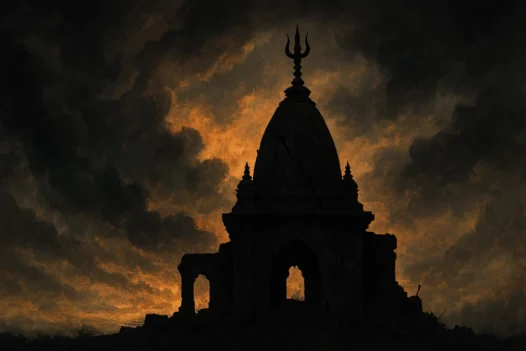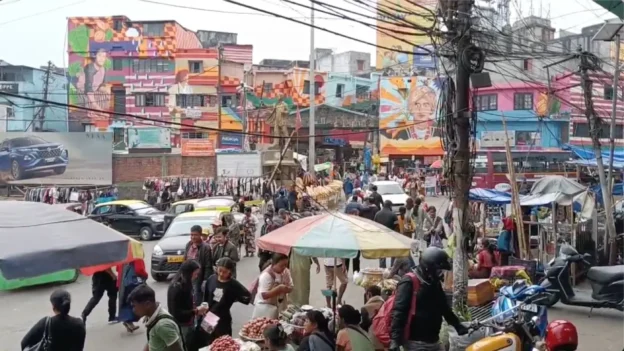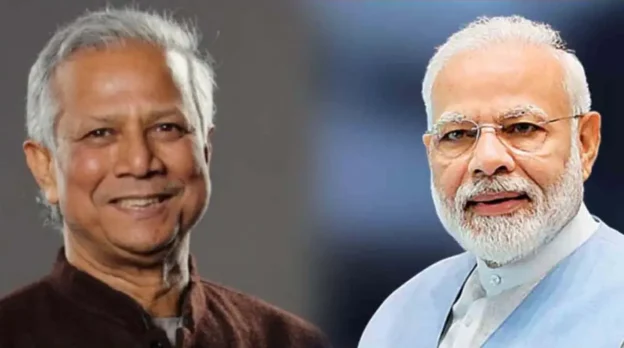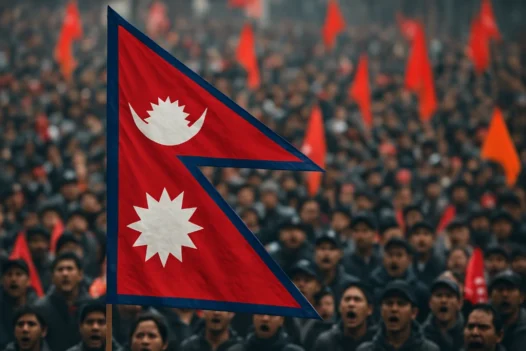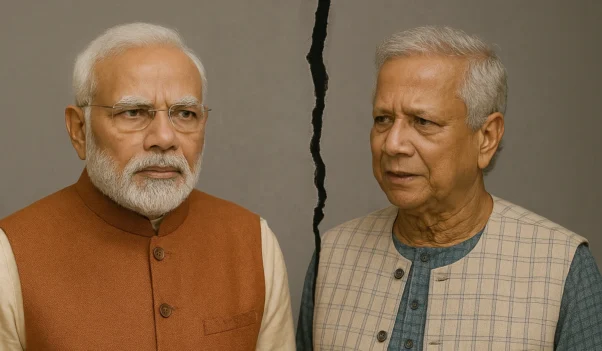Wednesday night’s vandalism at Dhanmondi 32, the historic residence of Sheikh Mujibur Rahman—Bangladesh’s founding leader and the father of the 1971 liberation war—was not merely an act of destruction. It was a blatant, fascist attempt to erase a crucial chapter of Bangladesh’s history, an assault that cements suspicions about the true motives behind the so-called student protests of August. This was not the work of innocent demonstrators but part of a larger, insidious plan to rewrite the story of Bangladesh’s formation and diminish the legacy of its greatest leader, Bangabandhu Sheikh Mujibur Rahman.
The rampage at Dhanmondi 32 was not the work of innocent student protesters, as some headlines would suggest. Rather, it was carried out by elements with a deeper, more dangerous agenda—to distort the history of Bangladesh’s formation and diminish the role of its founding father. Even if some of the perpetrators were unwittingly drawn into this web of violence, they have, knowingly or unknowingly, played into the hands of forces that seek to turn Bangladesh away from its secular and independent path.
The timing of this attack is crucial. With former Prime Minister Sheikh Hasina in exile in India following the upheaval that led to her ouster, the so-called students’ protests of August now appear to be a smokescreen for a far more insidious operation. The recent events have laid bare the hands of forces that seek to resurrect the shadows of East Pakistan and dismantle the hard-won sovereignty of Bangladesh. Even within the interim government led by Dr Muhammad Yunus, there is little doubt that Wednesday’s destruction was far more than spontaneous unrest—it bore the unmistakable imprint of actors long opposed to Bangladesh’s independence.
Among the prominent figures linked to the vandalism are Hasnat Abdullah, convener of the Anti-Discrimination Student Movement, and Sharif Osman Hadi, leader of the Inquilab Mancha and a member of the Jatiyo Nagorik Committee. Their statements on social media, particularly Hasnat’s incendiary post declaring, “Tonight, the land of Bangladesh will be freed from fascism,” serve as damning evidence of premeditation. The Dhaka Tribune further reported that figures such as Hadi had openly shared warnings of the attack before it unfolded, making it clear that the violence was not a spontaneous reaction but a well-planned assault on Bangladesh’s historical fabric.
While some have attempted to justify the destruction by linking it to Hasina’s planned speech from exile, the reality is far graver. The vandalism of Mujib’s house is symptomatic of a larger strategy by vested interests, both domestic and foreign, to erase his legacy and reverse Bangladesh’s progress as a sovereign, independent state. Even within the interim government, there have been strong calls for action.
Bangladeshi media too has highlighted the growing discontent within the current interim administration. The Dhaka Tribune reported that Firoz Ahmed, a member of the interim government’s Constitutional Reform Commission, has called on the Yunus-led administration to bring the vandals to justice. “Whoever was involved in this act, whoever incited it—no matter who they are—the Yunus government must take action against them,” he wrote on Facebook soon after the house was set on fire.
He went further, throwing down a challenge to the administration: “As an interim government, the bare minimum proof of your legitimacy would be ensuring justice for this. If the government cannot guarantee the safety of properties in Bangladesh, and if such destruction can happen with announcements, then the government’s existence is essentially meaningless.”
Firoz’s warning was stark— that the masterminds behind this attack are driven by fascist arrogance. “If they succeed politically, Bangladesh will turn to ashes. I hope they will fail. These greedy and barbaric individuals will not get far by exploiting the July uprising,” he wrote, while pointing out the dangerous consequence of such violence: it emboldens intelligence agencies and bureaucratic forces, ultimately pushing Bangladesh into the hands of “undemocratic forces –including our neighbouring ones.”
These sentiments resonate widely among Bangladeshis who cherish the country’s hard-fought independence. A left-wing political activist from Chittagong remarked, “They have seen the contributions and the sufferings of their fathers, uncles, family members, friends and others, and it is not easy for them to give in to radical and fascist forces like the Jamaat.”
Sheikh Hasina, now in exile, has always maintained that her late father’s legacy must be preserved. It was at Dhanmondi 32 that Sheikh Mujibur Rahman proclaimed Bangladesh’s independence from Pakistan in 1971. It was also there that he was assassinated in 1975. Hasina later converted the house into a museum, a living testament to the struggle that birthed Bangladesh.
At the same time, the external influences behind these events cannot be ignored. Social media platforms saw an outpouring of support for the vandalism from accounts linked to Pakistan, where figures openly celebrated the attack on Mujib’s residence. A post from the X account ‘Defence Pakistan’ declared, “End of a Traitor’s Legacy. Mujibur Rahman’s house in Dhaka demolished by Bangladeshi Revolutionaries,” further claiming that “this was the very place where he conspired with India to break Pakistan.”
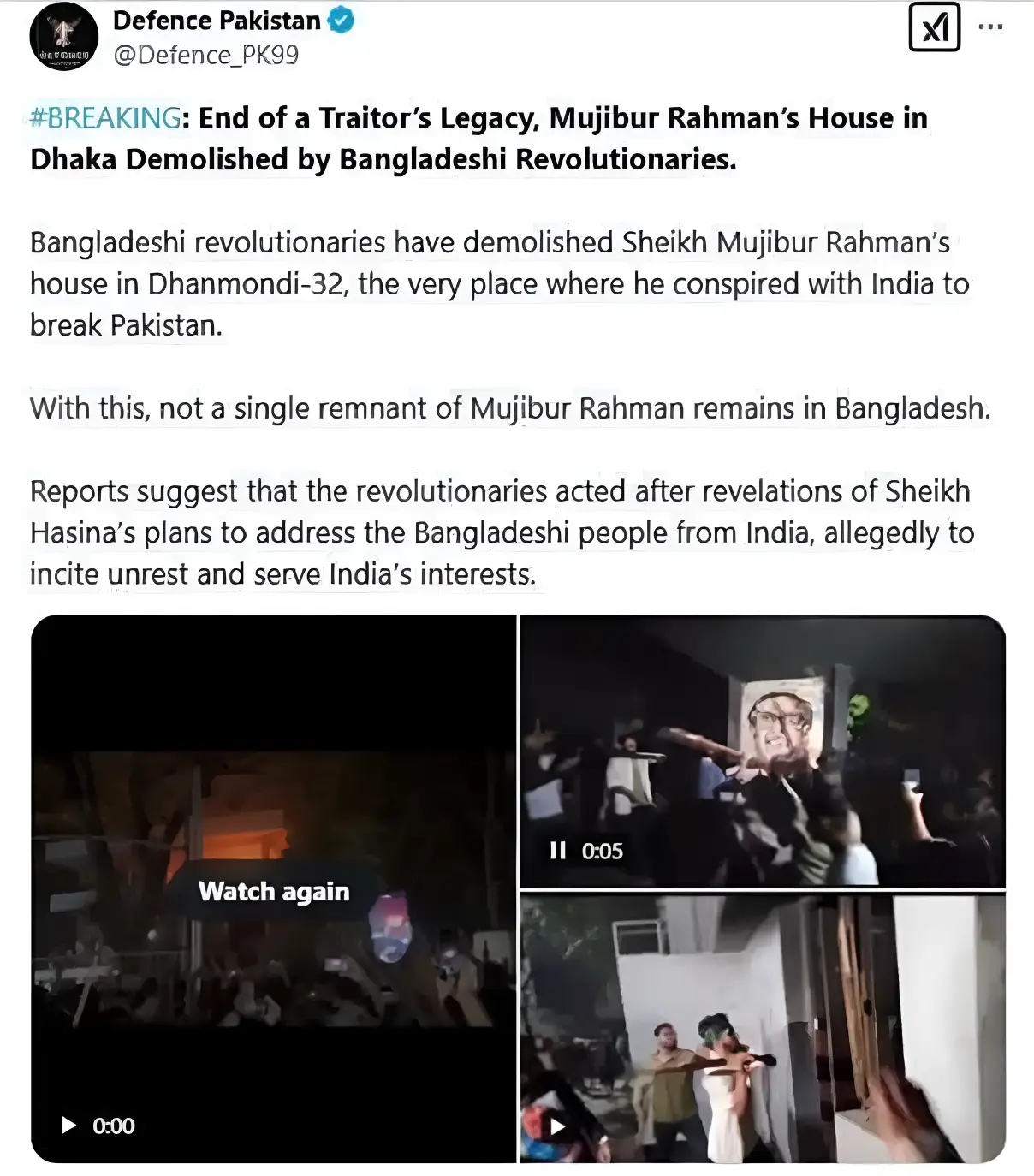
Another post triumphantly declared, “The two-nation theory remains alive.” These statements expose the deep-rooted desire among pro-Pakistan elements to dismantle Bangladesh’s sovereignty.

There are compelling reasons to believe that Pakistan has played a role in instigating this violence by mobilising groups like Jamaat-e-Islami and other pro-Pakistani outfits. History is replete with instances of Pakistan’s Inter-Services Intelligence (ISI) attempting to destabilise Bangladesh, and recent events reinforce this suspicion. On 21 January, Pakistan’s notorious spy agency secretly dispatched four senior operatives to Dhaka—an alarming move that coincides with the current wave of attacks by extremist groups attempting to manipulate Bangladesh’s historical narrative.
India has responded with vigilance. Following reports of the ISI delegation’s visit, the Indian Ministry of External Affairs had issued a statement affirming its close monitoring of developments in Bangladesh. In India media reports quoted Ministry spokesperson Randhir Jaiswal had stated, “We keep an eye on all activities around the country and in the region, as well as all activities affecting our national security, and the government will take appropriate steps.”
According to sources in Bangladesh, the Jamaat-e-Islami and its student organisation are at the forefront of orchestrating these attacks in multiple districts, with more violence expected. As the situation continues to unfold, the Yunus administration finds itself at a crossroads. Will it take decisive action against these forces and uphold the spirit of Bangladesh’s independence, or will it allow history to be rewritten by those who seek to erase the sacrifices of 1971? The answer to this question will determine the future of Bangladesh, a nation now standing at the precipice of a battle for its soul.

